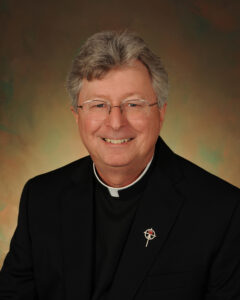By Fr. Joe Nassal, C.PP.S.
Growing up on a farm, CP Estes knew her family had burned the land from time to time because “the ash made tired ground more fertile again.” But after one such burning, she asked her uncle what he would plant in the field and was surprised when he told her, “I will seed nothing.” Her uncle told her he would leave the landed unseeded “as an invitation.”
For just as it “was a blessing to welcome the stranger, to give comfort to the wanderer, and especially to the weary traveler,” her uncle told her, “So, too, the land has the hospitality of the true host. For the earth is so patient. It takes the seed, the weed, the tree, the flower; it takes the rain, the grain, and the fire. It allows and invites entry. It is the perfect host.”
Practicing hospitality is a hallmark of our Precious Blood spirituality. Unfortunately, many in our world have failed to listen to what the Earth seeks to teach us about hospitality. Sometimes it takes hurricanes and floods and wildfires to get our attention about climate change and global warming.
Our unwillingness to listen to the Earth, to learn from nature, is also reflected in our relationships with one another, especially with people from other cultures or creeds, with people who hold different views or who see through a different lens than we do.
Both the first reading from the prophet Isaiah and the parable from Matthew’s Gospel speak of being good stewards of God’s vineyard. In the parable, the tenant farmers go to the extremes by not only refusing to offer hospitality to those sent by the owner of the vineyard for his share of the produce but turning to violence. They even kill some of the messengers the owner sends to negotiate with the grape growers. Even when he sends his own son, the farmers “seize him, drag him outside the vineyard, and kill him.”
The parable reminds us how redemption and new life come out of ruin. The rejection suffered by Jesus will be the means of salvation for the world. Jesus is “the stone rejected by the builders” that becomes the cornerstone of a new creation.
In the vineyard of today’s world, the harvest of justice seems to be far off. Instead of harvesting hope, justice and peace in this vineyard, so many people taste only sour grapes of wrath, of war, of violence, and exclusion.
In these dangerous times, we draw some measure of hope—and a large challenge—from the message of St. Paul in the second reading. Our challenge is to cultivate an attitude that Paul describes: “Have no anxiety at all, but in everything, by prayer and petition, with thanksgiving, make your requests known to God.” If we live the qualities Paul outlines—truth, honor, justice, purity, graciousness and love—then “the peace of God that surpasses all understanding will guard your hearts and minds in Christ Jesus.”
All of us have anxieties, all of us claim more than a few fears, and all of us have known failures even after our best efforts. There is certainly more than enough to be anxious about in our world today, but our challenge is to trust that in our prayer, when we live with grateful hearts, we will know “the God of peace will be with us.”
As people who work and pray in the vineyard of the Precious Blood, we believe it is out of the ashes that new hope will rise. At every Eucharist, we celebrate how God takes our failures and transforms them into a future full of hope. For it was on the night he was betrayed, that Jesus gave us the greatest of gifts, his body and blood.
Though at times we feel like tired ground, worn out and weary of life, unable to produce a harvest of justice; though at times we taste the bitter disappointments of life and respond with sour grapes; though at times sickness and loss and the death of loved ones stop us in our tracks, we proclaim our belief that God will continue to bring new life, new hope, and new growth out of the ashes of our lives.
![]()
 Fr. Joe Nassal, C.PP.S., a noted author, preacher and retreat leader, also serves as vice provincial director of the Missionaries of the Precious Blood, United States Province.
Fr. Joe Nassal, C.PP.S., a noted author, preacher and retreat leader, also serves as vice provincial director of the Missionaries of the Precious Blood, United States Province.

